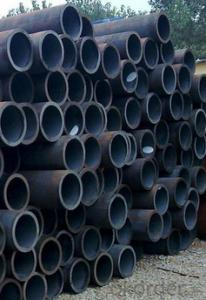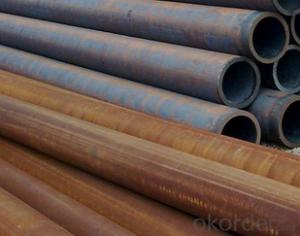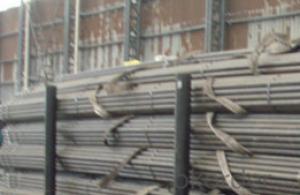Cold Drawn Carbon Steel Seamless Pipe P11 CNBM
- Loading Port:
- Qingdao
- Payment Terms:
- TT OR LC
- Min Order Qty:
- 10 pc
- Supply Capability:
- 30 pc/month
OKorder Service Pledge
OKorder Financial Service
You Might Also Like
Quick Details
| Thickness: | 1.2 - 20 mm | Section Shape: | Round | Outer Diameter: | 12.7 - 168 mm |
| Secondary Or Not: | Non-secondary | Application: | Boiler Pipe | ||
| Technique: | Cold Drawn | Certification: | PED | Surface Treatment: | oil coating |
| Special Pipe: | Thick Wall Pipe | Alloy Or Not: | Is Alloy | ASTM A213: | T2,T5,T9,T11,T12,T22,T23,T91,T91 |
| ASTM A335: | P1,P2,P5,P9,P11,P12,P22,P23,P91,P92 | DIN17175: | 15Mo3,10CrMo910,12CrMo195,13CrMo44 | Grade: | 12Cr1MoV,Cr5Mo,Cr9Mo,12Cr1MoVG,Cr5MoG,A335 P11,A335 P5,A335 P9,A335 P1,A213,A192,A210,A335 P12,A335 P23,St35.8,Cr-Mo alloy,A53-A369,ST35-ST52 |
| Standard: | BS 3059-2,DIN EN 10216-1-2004,DIN 17175,ASTM A213-2001,ANSI A210-1996,ASTM A179-1990,BS,DIN,ASTM |
Packaging & Delivery
| Packaging Detail: | Seaworthy export packing |
| Delivery Detail: | 45 Days |
Specifications
Standard:ASTM A179,DIN17175
Material:SA179,ST35.8
Size:12*1.2-168*20
Manufacture:cold drawn
Heat treating: normalized
Product Description
Commodity: cold drawn carbon steel seamless pipe
Standard&material: ASTM A213 T2,T5,T9,T11,T12,T22,T23,T91,T92, ASTM A335 P1,P2,P5,P9,P11,P12,P22,P23,P91,P92, DIN17175 15Mo3,10CrMo910,12CrMo195,13CrMo44, and equivalent standard and material.
Size range: 12mm*1.2mm - 168mm*20mm
Manufacture method: cold rolled, cold drawn
Delivery condition: Normalized, Normalized and Tempered.
Mill test certificate as per EN10204 3.1B is available.
Third party inspection is acceptable.
Tubes will be ECT+UT.
Packaging & Shipping
Packing: tubes will be packed in bundles tied with steel strips.
Oil coating,varnish,or black painting to be confirmed.
End plastic caps to be confirmed.
External packing by knit bags.
Marking: to be confirmed.
- Q:What is the impact resistance of steel pipes?
- Steel pipes have high impact resistance, meaning they can withstand significant external forces without fracturing or breaking. This makes them highly durable and suitable for various applications, especially in industries where they are subjected to heavy loads or potential impacts.
- Q:What are the alternatives to steel pipes for various applications?
- There are several alternatives to steel pipes for various applications. Some common alternatives include pipes made from materials such as plastic (polyvinyl chloride or PVC), copper, cast iron, and ductile iron. Each alternative offers different benefits and drawbacks depending on the specific application, cost, durability, and environmental considerations.
- Q:Are steel pipes suitable for semiconductor manufacturing plants?
- Yes, steel pipes are suitable for semiconductor manufacturing plants. Steel pipes are known for their durability, strength, and resistance to corrosion, making them an excellent choice for various industrial applications, including semiconductor manufacturing. In semiconductor manufacturing plants, various chemicals and gases are used throughout the production process. Steel pipes are highly resistant to corrosion and can withstand the harsh chemicals and gases commonly found in semiconductor manufacturing environments, ensuring the integrity and longevity of the piping system. Furthermore, steel pipes can handle high-pressure applications, which are often required in semiconductor manufacturing plants. They have excellent mechanical properties and can withstand heavy loads and stress, making them reliable for transporting fluids and gases at high pressures. Another advantage of steel pipes is their flexibility in terms of size and shape. Semiconductor manufacturing plants often require a complex and intricate piping system to accommodate different processes and equipment. Steel pipes can be easily customized and fabricated to fit specific requirements, allowing for efficient and seamless integration into the plant's infrastructure. Overall, steel pipes offer the necessary qualities and characteristics required for semiconductor manufacturing plants. Their durability, corrosion resistance, high-pressure capabilities, and flexibility make them a suitable choice for transporting chemicals and gases in this industry.
- Q:What are the different types of steel pipe connections?
- There are several types of steel pipe connections, including threaded connections, welded connections, flanged connections, grooved connections, and compression connections.
- Q:How are steel pipes insulated against heat loss?
- Steel pipes can be insulated against heat loss using several methods. One common method is through the use of insulation materials such as mineral wool or fiberglass wraps. These materials are wrapped around the pipes to create a barrier that reduces heat transfer. Another method is the application of insulation coatings, such as foam or rubber coatings, directly onto the surface of the pipes. These coatings create a protective layer that minimizes heat loss. Additionally, thermal tape or heat-resistant tape can be used to seal any gaps or joints in the insulation, ensuring a continuous barrier against heat loss. Overall, insulating steel pipes against heat loss is essential to maintain the temperature of the fluid or gas being transported and to increase energy efficiency in various industries.
- Q:Can galvanized steel tubes simmer?
- I make the steel pipe, galvanized pipe and water conveying pipe material is the same, can be bent, specific to what to look at the furnace, can refer to a single material
- Q:What are the common applications of seamless steel pipes?
- Seamless steel pipes have a wide range of applications in various industries. Some common applications include oil and gas exploration and transportation, construction and infrastructure projects, automotive manufacturing, power generation, and chemical processing. They are also used in industries like aerospace, telecommunications, and pharmaceuticals where high precision and reliability are required. The seamless design of these pipes ensures superior strength, durability, and resistance to corrosion, making them suitable for demanding environments and critical applications.
- Q:What are the common applications of steel pipes in construction?
- Steel pipes are commonly used in construction for various applications such as plumbing, structural support, transportation of fluids and gases, underground drainage systems, and the construction of infrastructure like bridges and buildings.
- Q:What is the difference between steel pipe and aluminum pipe?
- Steel pipes and aluminum pipes differ primarily in their composition and physical properties. Steel pipes are composed of iron and carbon, with added elements for strength and corrosion resistance. In contrast, aluminum pipes are made entirely of lightweight and highly corrosion-resistant aluminum. The weight of the pipes is a significant distinction. Steel is denser than aluminum, making steel pipes heavier and more robust. This characteristic makes steel pipes ideal for applications requiring structural strength and load-bearing capabilities. On the other hand, aluminum pipes offer advantages due to their lightweight nature. They weigh only about one-third of steel pipes, making them easier to handle, transport, and install. This lightweight property is especially beneficial in industries such as aerospace and automotive, where weight reduction is crucial. Corrosion resistance is another important consideration. Steel pipes are prone to rust and corrosion, especially in moist or corrosive environments. To address this issue, steel pipes are often coated or galvanized. In contrast, aluminum pipes naturally resist corrosion due to the formation of a protective layer of aluminum oxide on their surface. Cost is also a factor to consider. Generally, steel pipes are more cost-effective due to lower raw material and manufacturing costs. However, long-term maintenance costs and lifespan may vary between steel and aluminum pipes, so specific requirements and durability should be taken into account. In conclusion, the difference between steel and aluminum pipes lies in their weight, strength, corrosion resistance, and cost. Steel pipes are heavier, stronger, and more prone to rust and corrosion but are generally more cost-effective. Aluminum pipes are lightweight, corrosion-resistant, and costlier but offer advantages in weight reduction and specific applications requiring corrosion resistance. The choice between steel and aluminum pipes depends on the project's needs and desired properties for optimal performance.
- Q:What are the different methods of pressure testing steel pipes?
- There are several different methods of pressure testing steel pipes, including hydrostatic testing, pneumatic testing, and ultrasonic testing. Hydrostatic testing involves filling the pipe with water and pressurizing it to a specified level to check for leaks or weaknesses. Pneumatic testing is similar but uses compressed air or gas instead of water. Ultrasonic testing involves using high-frequency sound waves to detect any defects or flaws in the pipe. Each method has its own advantages and is chosen based on the specific requirements and industry standards.
1. Manufacturer Overview |
|
|---|---|
| Location | |
| Year Established | |
| Annual Output Value | |
| Main Markets | |
| Company Certifications | |
2. Manufacturer Certificates |
|
|---|---|
| a) Certification Name | |
| Range | |
| Reference | |
| Validity Period | |
3. Manufacturer Capability |
|
|---|---|
| a)Trade Capacity | |
| Nearest Port | |
| Export Percentage | |
| No.of Employees in Trade Department | |
| Language Spoken: | |
| b)Factory Information | |
| Factory Size: | |
| No. of Production Lines | |
| Contract Manufacturing | |
| Product Price Range | |
Send your message to us
Cold Drawn Carbon Steel Seamless Pipe P11 CNBM
- Loading Port:
- Qingdao
- Payment Terms:
- TT OR LC
- Min Order Qty:
- 10 pc
- Supply Capability:
- 30 pc/month
OKorder Service Pledge
OKorder Financial Service
Similar products
New products
Hot products
Related keywords































